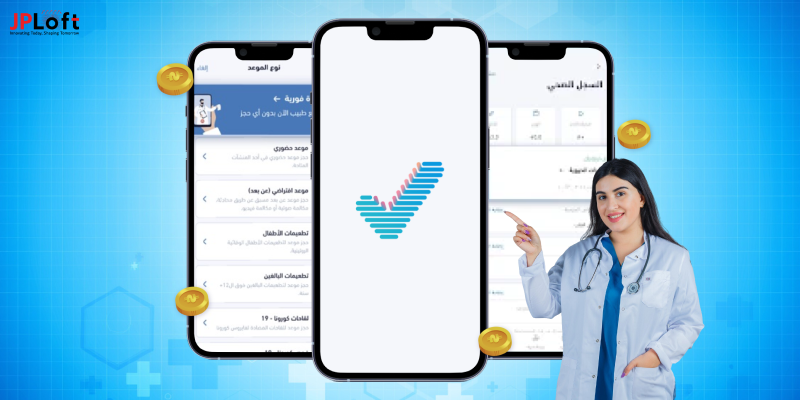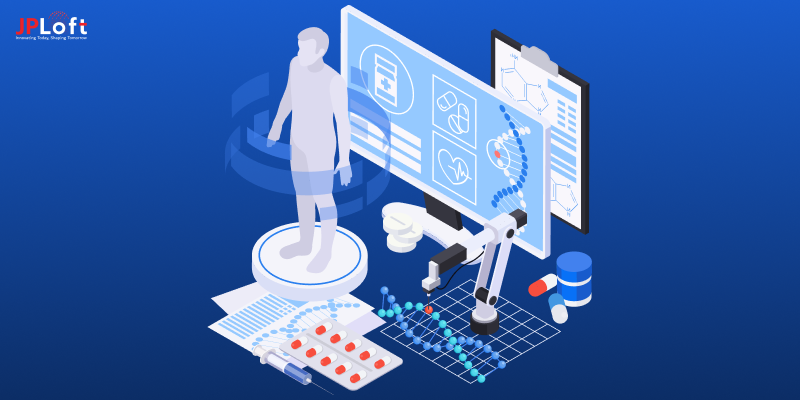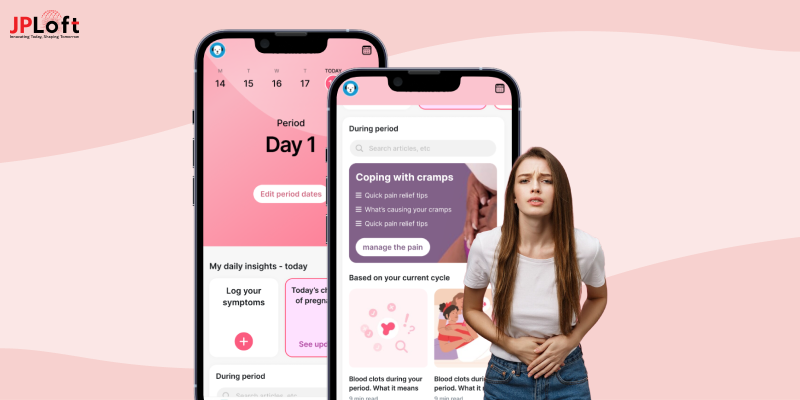2020 marked a historic turning point both personally and in terms of the health apps market. CB Insights reported that all aspects of telemedicine - health education services, remote patient monitoring (RPM),and remote doctor-patient consultations - saw their investments soar by nearly 300%! Rising awareness of personal health and wellness, rapid technological progress, and an urgent need for accessible healthcare services have contributed to an unprecedented surge in healthcare app development solutions. More doctors and patients than ever before have adopted mobile health apps as part of their healthcare regimen, making now an excellent time to create one explicitly tailored to meet their needs. Today's technology is crucial in medicine, from monitoring patients to relieving professionals of workload pressures. It has revolutionized all significant processes within the industry. Build a Healthcare App that can be a valuable addition to these advancements, as these applications manage customer health records more effectively and change the healthcare model to a patient-centric one, enabling consumers to track their well-being independently.
What Is Healthcare App Development?
Healthcare app development refers to creating mobile applications to carry out health processes in real time and allow users to place and track requests through this application, such as medical services, electronic records, or insurance claims. Since the global healthcare industry has changed dramatically, patients and doctors alike have become more vigilant regarding processes in the field. With that, managing records and initiating medical journeys have also advanced significantly. Telemedicine and fitness applications will aid patients during their journey and may help increase diagnosis coverage. A mobile healthcare application development project may serve multiple functions, including patient management.
- An app for doctors will help them keep an eye on patients and monitor them, as well as schedule appointments and manage staff.
- Patients using digital health solutions will use applications designed to book appointments or even connect directly with doctors.
Healthcare mobile applications are rapidly gaining ground in the market. To give an idea of their popularity, here are some numbers and statistics that might surprise you.
- One can find around 45,4700 healthcare apps in the Apple store alone, while on the Play store, there are approximately 43280 applications!
- By 2026, the global telemedicine market will reach $17.14 billion.
Types of Healthcare Apps
You must select an app that best meets all your needs based on the services provided. Here, we present six popular healthcare app categories available today.
Urgent care apps
Urgent care apps (also referred to as ER platforms) are apps designed to assist people who find themselves in emergencies in getting help as quickly as possible. Such applications typically provide directions and travel/wait time estimates to the nearest emergency departments based on medical insurance or not, and also show travel/wait time estimates. Urgent care apps often include features like:
- GPS tracking
- Cost estimator calculator
- Emergency departments also often maintain contact databases for emergency care providers to contact in an emergency.
- Emergency contacts, including close family member numbers.
Additionally, these apps provide basic instructions that can help those witnessing an emergency first offer medical assistance to patients in an emergency - for instance, helping someone with a seizure.
General hospital apps offer this level of support.
General Hospital Healthcare apps help enhance communication between physicians and patients and serve as promotional tools. Such apps should include EHR integration and profiles and availability of information about each doctor on staff.
- patients' profiles where they can access lab reports or electronic prescriptions
- treatment and service lists that the hospital provides
Hospital apps often incorporate appointment management capabilities into their offerings. This feature usually involves calendars where patients and healthcare professionals can easily monitor upcoming visits and medical procedures; virtual appointments via audio/video calls have also become vital post-pandemic. Please take note that hospital app development typically involves working closely with medical facilities to develop an app that genuinely benefits its users in real-world conditions.
Diagnostic and preventive care apps
Diagnostic and preventive care apps are designed for diagnostic medicine, providing access to personal medical history and test results and scheduling new ones, with symptom checkers helping users decide what tests to take or which professionals they should see. Some features of diagnostic apps may include:
- Electronic health record (EHR) integration.
- Scheduling costs and lab results of scheduled medical tests.
- Symptom Checker or AI-powered Diagnosis Assistant.
- Appointment Management.
- Guides and information on chronic illness management and leading a healthy lifestyle.
Telemedicine apps
Telemedicine apps (or doctor-on-demand apps),also referred to as doctor-on-demand platforms, were created to deliver healthcare services remotely and seamlessly. For remote consultations, patients communicate with doctors via text, audio, or video channels. Critical features of telemedicine apps include:
- Integration of electronic health record (EHR) technology.
- Patient and doctor profiles with dashboards and dashboard views.
- Doctor profiles featuring ratings and reviews.
- Appointment management services (such as scheduling).
- Text audio or video chats.
- Electronic prescriptions.
Telemedicine apps may also use IoT technologies, enabling patients to utilize additional devices to measure blood pressure, sugar level, and other vital signs that will be sent directly to a physician for more efficient treatment.
Healthy Lifestyle Apps
This category of apps encompasses an abundance of subcategories. From tracking water and calorie consumption, daily steps taken, and quality of sleep monitoring to reminding users to have regular medical checkups, such mobile platforms aim to encourage users to develop habits of healthy living that prevent potential health problems. Though its features depend on your app's goals, some of the more commonly seen ones include:
- Users' profiles with data like their activity level, weight, and medical conditions.
- As well as habit tracking.
- Push notifications.
- Guides with proper nutrition or sports activities.
Mental health apps
Mental health apps exist to assist users in managing any mental health condition, whether anxiety, depression, or eating disorders. Mental health apps offer tools that allow patients to track and enhance their progress - typically, this could include tools like:
- Communication features include text, audio, or video chat for communicating with therapists.
- Therapy session scheduling.
- Progress trackers.
- Activities to promote mental well-being, such as meditation tools.
- Support group chats.
- Patients' medical health records.
Healthcare App Features That You Definitely Should Utilize
The features you should expect in a healthcare app depend on its type and purpose; however, specific essential requirements apply across most health apps, whether telemedicine ones, general hospital apps, or urgent care apps. Here is a list of features:
Sign-Up/Sign-In
While in-app registration may require gathering an extensive amount of user information, sign-in should be quick and painless. For instance, offering signing in through an email client is highly desirable.
Doctor and patient profiles
Physician profiles should include specialization, educational background, and availability at their healthcare facility. Meanwhile, patients' profiles should contain their medical details, including medications they are taking and any history they may have had that might impact them negatively.
Appointment Management
This feature can be made accessible via a calendar where doctors can view their upcoming appointments, and their patients can see when their doctor is available so that they can book one accordingly.
In-App Chat
This feature can help facilitate fast communication with healthcare facility managers or directly with physicians.
Video Consultations
Since the pandemic made in-person consultations less safe for patients, any appointments that can be conducted online now take place via video calls - both doctors and patients benefit from this feature as they save time by working assignments online without the risk of getting sick from hospital visits.
EHR Integration
Doctors who see patients for appointments or procedures update their treatment histories in an electronic health record (EHR). Integrating an EHR into your app is critical if you want to provide optimal patient care; additionally, it makes the job of other healthcare providers much simpler if they come into contact with these records in the future.
E-Prescriptions
With most consultations now taking place online, doctors should also be able to prescribe medicine online as part of the consultation experience. An added advantage of e-prescriptions is their increased security compared to paper versions - these documents are more difficult for counterfeiters to falsify than their paper counterparts.
Payment Gateway
Users should be able to make in-app payments to deliver paid medical services. When selecting payment gateways, it's wise to prioritize those that support not just credit and debit cards but also digital wallets and crypto payments.
Ratings and reviews
Alternative methods of payment such as ratings and reviews.
Push notifications
Push notifications primarily serve patients by helping them select an experienced professional that best meets their needs. At the same time, push notifications also serve healthcare workers and patients as reminders about upcoming consultations or alarm medication reminders.
Step-by-Step App Development Process for Healthcare Apps
Medical application development can vary considerably.
Analyze a Problem
When creating a healthcare app, the process can differ considerably. If you're looking to build a healthcare app that aims to solve a specific problem or set of issues for users, three critical areas must be examined: Patient, Provider, and Pharmacy.
Determine Your Platform
For Android development, knowing Android components and working with the Google APIs should all be of priority. However, iOS development won't require as much Java knowledge. Still, familiarity with Objective-C programming languages and Apple frameworks can suffice.
Pre-Requisites
Before build a healthcare app you must understand migratory app design patterns. Furthermore, understanding web technologies like HTML and JavaScript is vital, as these can be used to create dynamic websites.
Select an App Launch Location
When targeting a global market, selecting a launch location for the app launch is essential. The US and UK offer great user bases, which could lead to success with this step.
Pay Attention to UI/UX
User interface and user experience are distinct concepts concerning performance. With healthcare apps, responsive users must make purchases without difficulty; having a great UI/UX design that caters to everyone will ensure success.
Contract with an App Development Company
Hiring a reliable mobile app development company to build a healthcare app will ensure your app features cutting-edge functions at minimum costs, with their professional team offering invaluable guidance on designing and developing a scalable healthcare app.
Focus on Developing MVP and Validating It
To ensure the success of an app, creating an MVP before entering the market can be one of the key ingredients to its success. Using an MVP ensures that applications have been extensively tested and validated before their release on the market. To ensure you successfully create an MVP, work with a healthcare app development agency to analyze its core features before planning its development accordingly.
Test your Application
Testing your health app is one of the critical aspects to consider in its creation, so ensure all aspects, from user experience to interface design, user content development, and more, are thoroughly examined before moving ahead with development. Proper testing of your telehealth app will reduce both development time and costs to create it and help identify bugs quickly, thus strengthening its reputation among service providers.
Launch the App and Track Performance
Once your app has been tested and released to users, it's time to welcome them in! After launch, don't overlook tracking its performance either; use in-app analytics tools during the development stage, listen carefully to users' concerns/requests, and then implement updates that keep the users engaged with your application.
Industry Challenges in Healthcare and why Healthcare Businesses Falter do?
Once you build a healthcare app for your business you can face all these challenges. Even in an expanding market, healthcare providers hesitate to release mobile healthcare apps for several reasons, which prevent mobile solutions from making significant differences for medical stakeholders and marking a radical departure from traditional care worldwide. Let's dive deeper into why the healthcare sector should consider mobile technology more often.
Lack of Focus in Any One Area
Healthcare systems are highly complex and require complete focus from practitioners, managers, and administrators alike. Unfortunately, finding time to examine every detail of your healthcare business can be complicated with all that else happening around you; also, due to all its many aspects requiring your consideration, it can be easy to overlook some elements until they become incredibly relevant to the big picture.
Lack of Information
Mobile applications have become ubiquitous globally, yet stakeholders don't have enough information to decide.
Increased Demands
Healthcare roles have become more demanding each year and remain unrewarding, prompting doctors and healthcare workers to demand a holistic approach that includes mobile apps as part of their job roles.
Mobile Apps Can Provide Help Anytime and Anyplace
Mobility is becoming an ever-increasing trend within healthcare, and more people would likely appreciate accessing your application outside the traditional 9-5 office hours.
Lack of Interoperability
Meaningful use enables patients by giving them greater control of their healthcare information and treatment plans. With portable health technologies, a patient (with help from caregivers) can quickly understand their health concerns and plan for them accordingly.
Lack of Security
Healthcare stakeholders have become more conscious of the risks and dangers of mobile devices as healthcare solutions. Still, dynamic security models offer an effective solution.
Lack of Access to Appropriate Resources
Today's business landscape makes it challenging to learn everything independently from scratch, which makes keeping track of everything associated with the healthcare business difficult for stakeholders. From design and purchasing the device itself, keeping everything on your radar requires constant care from all parties involved - this may make stakeholders' jobs even harder!
Cost to Build a Healthcare App
Now that we understand the core features of build a healthcare app, their respective costs, and the components that impact its development cost estimates, let's assess the total cost estimate.
Platform Type
If your budget and timeline are limited, hybrid app development techniques could suit your healthcare app project. These apps use frameworks that combine web technologies with native shell development for faster results. However, hybrid healthcare apps cannot compete with native apps developed for iOS and Android platforms in terms of efficiency and scalability. To create one successfully may cost anywhere from $600,000 for developing both platforms independently to $400,000.00.
App Design
Keep in mind that app design has a direct effect on patient mobile app costs. From building simple to complex apps, designing them takes both time and the expertise of experienced mobile app designers. But take heart: minimalist designs may save money over elaborate ones!
App Maintenance & Support Services
Finally, be wary of the extra costs of developing healthcare android app development. Beyond initial development costs, the final price should include post-launch services such as app submission, ongoing maintenance, support, and upgrades.
Compliance and Regulations
Build a healthcare app comes with its own set of regulatory and compliance requirements that must be fulfilled to protect patient data and ensure its protection and privacy. Here are a few key considerations:
- HIPAA Compliance: The Health Insurance Portability and Accountability Act (HIPAA) sets standards to safeguard sensitive medical data, protecting its privacy and security.
- Data Security: Protecting sensitive patient information through secure storage, transmission, and disposal is of utmost importance. To do this effectively requires taking measures like encryption and installing secure socket layer (SSL) certificates.
- Patient Data Privacy: Healthcare apps must adhere to privacy laws and regulations such as the General Data Protection Regulation (GDPR) and the California Consumer Privacy Act (CCPA).
- Clinical Validity: An app must provide accurate and dependable health information that adheres to current clinical standards and guidelines.
- FDA Approval: If classified as a medical device, approval and regulation by the US Food and Drug Administration (FDA) may be required before its sale to consumers.
- Accessibility: Healthcare apps must comply with the Americans with Disabilities Act (ADA).
Conclusion
If you want to build a healthcare app, be aware of some challenges with user research and data security. Interviewing customers might prove challenging as sensitive topics may come up. My suggestion for interviewing potential customers is to focus on methodology instead of personal issues to make the interview phase smoother. In addition, make sure your app complies with HIPAA regulations, as it risks incurring penalties otherwise. Digitalization of healthcare empowers both patients and medical workers, which explains their support of it and an increase in tool demand. App development for healthcare can even strengthen preventive care measures and have long-term positive impacts on global populations.
FAQs
1. What are the main 2 types of healthcare apps?
Healthcare apps can generally be divided into two main categories - professional healthcare apps and patient healthcare apps. Doctor apps provide instruction for physicians, access records, diagnose medical conditions, prescribe medications, and manage internal matters; patient apps serve primarily for wellness/meditation/trackers/exercise/weight loss services or personal use in clinics or for personal healthcare use by individual users.
2. Most Downloaded Health App Categories by Downloads
Of the top-grossing health applications on Google Play in 2018, most were focused on diet and fitness/workout apps such as Headspace for meditation & mindfulness, which brought in over $1m revenue, while Calm was second with over 500,000 downloads as both served to relax users with meditation/sleep/relaxation features.
3. The most favorable countries to offer digital health solutions
Analysis of Market and Environment Another essential step when starting any healthcare app project is analyzing its market and environment. Meeting all applicable mobile healthcare regulations within each target country is of equal importance - this makes the US, UK, and Germany ideal locations for offering digital health solutions.
4. Main Reasons Why Healthcare App Projects May Falter
A healthcare app project can fail for various reasons, with usability issues, inaccessible content/language, and no tangible app concept being the primary factors. Furthermore, inadequate understanding of healthcare environments or lack of clinician feedback/involvement leads to product failure as additional considerations.













Share this blog